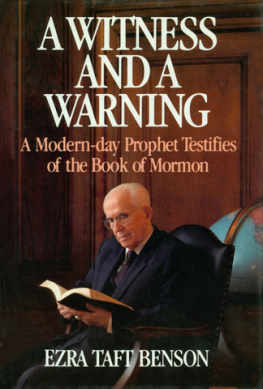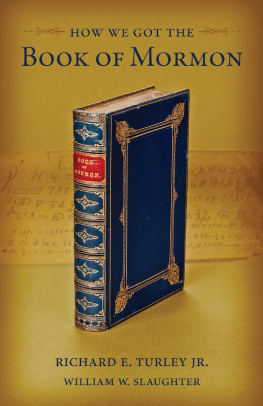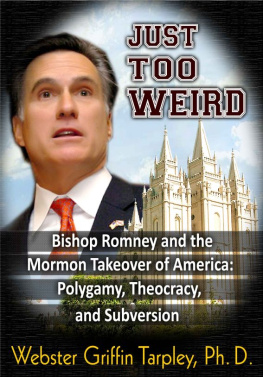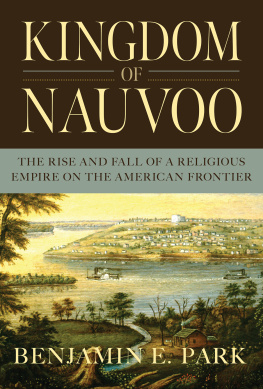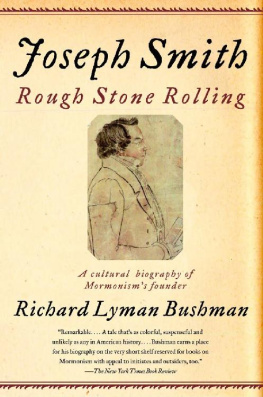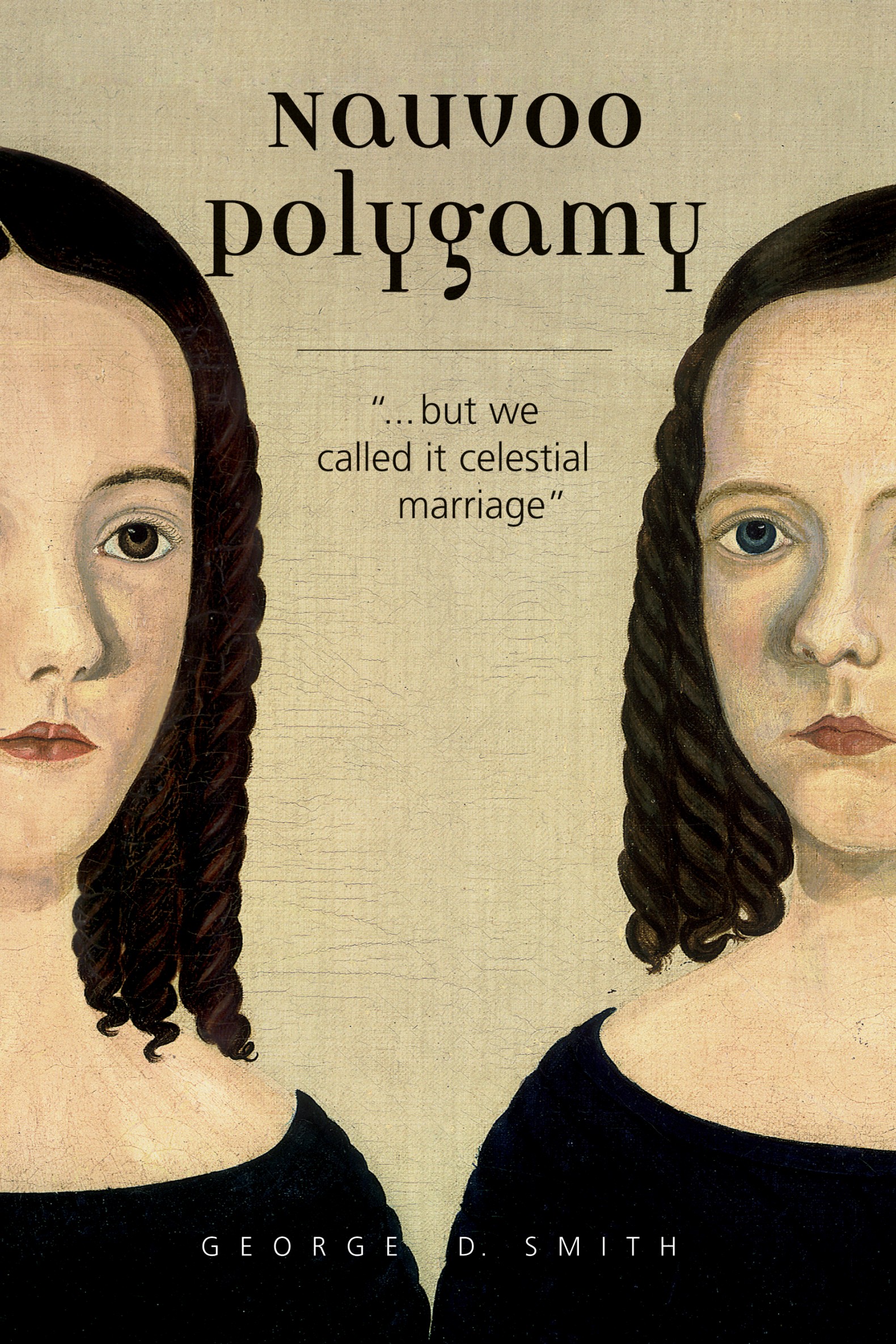Updated and Revised
Nauvoo
Polygamy
but we
called it celestial
marriage
George D. Smith
Signature Books
Salt Lake City 2011
2008, 2011 by Signature Books. All rights reserved. First edition, hardcover, 2008. Second edition, paperback, 2011. Signature Books is a registered trademark of Signature Books Publishing, LLC.
www.signaturebooks.com
The subtitle of Nauvoo Polygamy quotes the March 19, 1892, Temple Lot deposition of Emily Partridge, who described how Joseph Smith taught me this principle of plural marriage that is called polygamy now, but we called it celestial marriage ( Reorganized Church v. Church of Christ , question 23).
Painting on jacket: Sisters , artist unknown, ca. 1840, oil on canvas, 18 x 24 inches, courtesy National Gallery of Art, Washington, D.C., which received the painting as a gift from Edgar William and Bernice Chrysler Garbisch.
The text was composed in 11.25 pt. Janson.
Nauvoo Polygamy : but we called it celestial marriage was printed on acid-free paper and was composed, printed, and bound in the United States of America.
library of congress cataloging-in-publication data
Smith, George D. (George Dempster), 1938
Nauvoo polygamy : but we called it celestial marriage / George D. Smith.
2nd ed.
p. cm.
Includes bibliographical references and index.
ISBN 978-1-56085-207-0 (pbk : alk. paper) 1. PolygamyReligious aspectsChurch of Jesus Christ of Latter-day Saints. 2. MarriageReligious aspectsChurch of Jesus Christ of Latter-day Saints. 3. PolygamyReligious aspects Mormon Church. 4. MarriageReligious aspectsMormon Church. 5. PolygamyIllinoisNauvooHistory19th century.
6. Nauvoo (Ill.)Social conditions19th century. I. Title.
BX8641.S633 2011
261.83584230882893dc22
2010032062
To Libbie and Caroline,
who each married a sisters husband
how celestial is marriage
carriage to higher climes
spousal rhymes of double
treble images, shadows of
soft redundancy which night
might you be staying we
can negotiate but here you
are, rippling froth
cresting at days end
a favor here to savor
savior, angels warning sword
celestial kiss
in this Mans world a right
a privilege not to miss
Contents
Ilustrations
Charts
Kimball-Whitney Relations
Four Generations of the Smith Family
Schism within Mormonism
Summaries
Letters to the press from John C. Bennett
The Summer of 1842: Josephs Calendar
Nauvoo Plural Marriages
Brigham Youngs Childbearing Wives
Reports of Nauvoo Polygamy
Sixteen wives of John Bockelson
Map
Nauvoo, Illinois
Photographs
Letter to Sarah Ann Whitney and family, (transcription)
Photograph Section
Emma Hale Smith, Joseph Smith, Louisa Beaman, Agnes Coolbrith, Joseph B. Noble, Mary Elizabeth Rollins, Benjamin F. Johnson, Eliza R. Snow, Lilburn W. Boggs, John C. Bennett, Parley and Elizabeth Pratt, Eliza Maria Partridge, Brigham Young, Emily Dow Partridge and children, Lucy Ann Decker, Heber C. Kimball, Lucy Walker, Helen Mar Kimball, Hyrum Smith, Orson Pratt, Joseph F. Smith and family, Lorenzo Snow, John Taylor, Jan van Leiden (John Bockelson).
Tables
1.1: Interval between the first encounter and Nauvoo marriage
2.1: Three seasons, fifteen marriages
3.1: Joseph Smiths wives
3.2: Women of interest
3.3: Josephs courtships and Emmas pregnancies
3.4: Joseph Smiths inner circle of Nauvoo polygamists
4.1: The widows who married LDS leaders
4.2: The widows who took a different path
4.3: Josephs Nauvoo, 1841-44, families ranked by number of wives
4.4: Nauvoo period, 1841-46, families ranked by number of wives
4.5: Nauvoo and beyond, families ranked by number of wives
4.6: Rising incidence of wives
4.7: Nauvoo plural families
4.8: Nauvoo plural families by year of inception
4.9: Total wives in plural families by year of inception
4.10: Wives per family
8.1: Published affidavits of Josephs widows
8.2: Affidavits by date and provenance
Preface to the Paperback Edition
Since publication of this book, I have been able to speak at a number of professional and other venues and to receive criticism from historians and general readers. I have appreciated the advice, complaints, and expressions of surprise from those unfamiliar with this history.
One reader, not a Mormon, discovered an ancestor in the chart at the end of the book along with several wives and children. This reader had known that he had Mormons deep in his familys past, and here they were in black and white. A Parley Pratt family historian contacted me and offered corrections, which I have included in this edition, while excluding unresolved name-and-date disputes among family historians.
I have amended the text and notes for accuracy and diction. A new table (3.3, p. 238), Josephs Courtships and Emmas Pregnancies, illustrates ironies in their Smith marital chronology, such as Emmas conception just after Josephs plural union with Louisa Beaman.
Although many readers have offered congratulations on the scope and message of the book, others have voiced concern about the books tone where I related matter-of-factly what eyewitness sources reported. At one author and critics discussion, a fundamentalist Mormona wife in a polygamous familysaid my book was a difficult read because of its implied criticism of polygamy and was not something she would recommend to friends, even though, as she also said, she encountered much in the book that she found to be informative and personally valuable.
By contrast, a feminist critic expressed curiosity and unease with the inelegant aspects of Nauvoo polygamy, for instance how Joseph Smith characterized his invitation to friends to take additional wives as favors and privileges. This apparent commerce in women has been uncomfortable for some readers to accept. Resistance is understandable for those who were unaware of the nature of Nauvoo polygamy and whose view of a beloved church leader assumed present-day norms.
Another critic suggested that perhaps, based on what he considered to be the absence of evidence to the contrary, Joseph Smith may have had intimate relations only with single women he wed, but not with his plural wives who were already married. Of course, how would one know? Only a resulting child would prove a womans intimacy with her prophet-husband; however, the absence of a child would not disprove a spousal relationship. Melissa Lott testified that she roomed with Smith as his wife but did not bear him children due to lack of proper conditions on my part probably.
However, since the stated purpose of polygamy was to raise righteous seed marital intimacy would be presumed. Polygamy in the Old Testament was based on the command to be fruitful and multiply. Similarly, the Book of Mormon text gives conditional sanction to polygamy in the voice of the Lord of hosts, to raise up seed unto me (Jacob 2:30). Condemned in the past, polygamy was a future option, but only for propagation.
Smith shared marital intimacy with his wives. He ocupied the same room and bed with Almera Johnson that he had previously occupied with Eliza Partridge, according to a statement by Almeras brother, Benjamin. Sylvia Sessions Lyon disclosed that her union with Smith resulted in a child, their daughter, Josephine Lyon Fisher, that she was the prophets daughter. Scholar Richard Van Wagoner (recently deceased) recognized this parental identification of Smiths plural child.
Although discussion over the nature of Smiths relationships continues, we return to the only reason given as a defense for plural marriage, the propagation of righteous offspring. From its inception in Nauvoo, this rationale implied marital intimacy.


